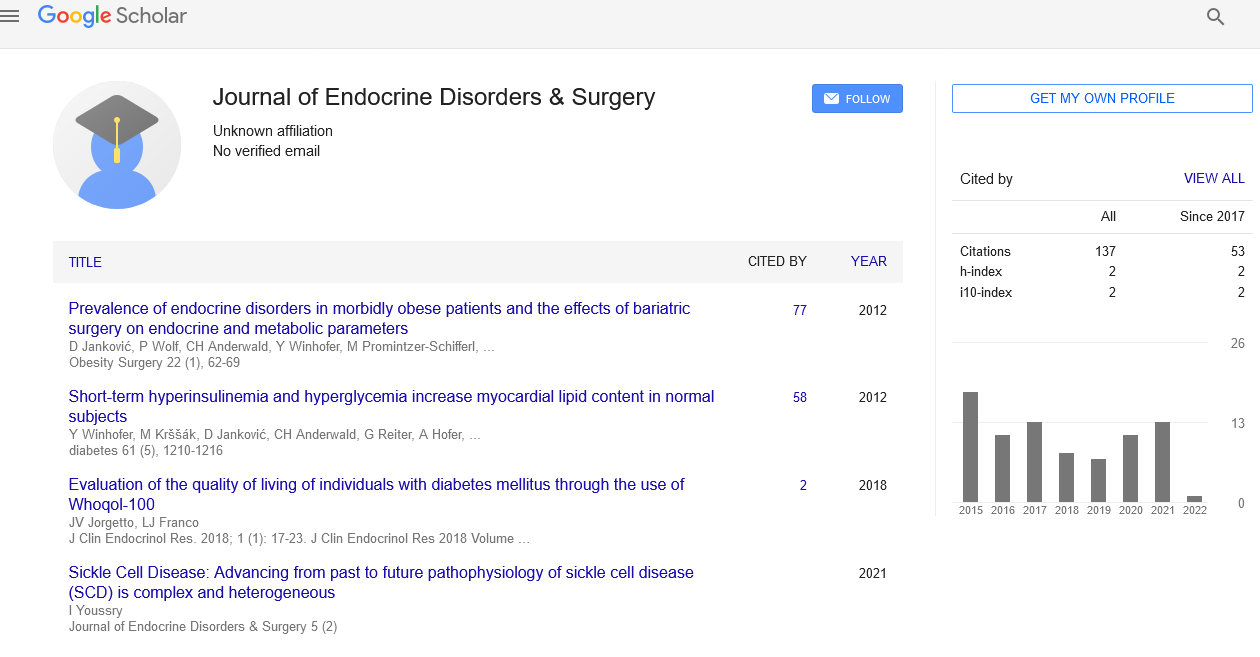Effect of metformin on insulin resistance
Received: 04-Oct-2022, Manuscript No. PULJEDS-23-6200 ; Editor assigned: 06-Oct-2022, Pre QC No. PULJEDS-23-6200 (PQ); Accepted Date: Oct 25, 2022; Reviewed: 10-Oct-2022 QC No. PULJEDS-23-6200 (Q); Revised: 12-Oct-2022, Manuscript No. PULJEDS-23-6200 (R); Published: 30-Oct-2022, DOI: 10.37532/puljds.2022.6(5).03
Citation: James A. Effect of metformin on Insulin resistance. J. Endocr Disord Surg. 2022; 6(5):03.
This open-access article is distributed under the terms of the Creative Commons Attribution Non-Commercial License (CC BY-NC) (http://creativecommons.org/licenses/by-nc/4.0/), which permits reuse, distribution and reproduction of the article, provided that the original work is properly cited and the reuse is restricted to noncommercial purposes. For commercial reuse, contact reprints@pulsus.com
Abstract
The primary pathogenic causes of Acanthosis Nigricans (AN) linked to obesity and/or polycystic ovarian syndrome are Insulin Resistance (IR) and associated Hyperinsulinemia (HI). As an insulin sensitizing medication, metformin may provide AN with a targeted therapeutic strategy. In order to compare obese females with or without AN to obese females without AN, we looked at the correlations between the severity grade of AN and Body Mass Index (BMI), Waist-To-Hip Ratio (WHR), Insulin Resistance (IR), serum levels of Insulin-Like Growth Factor-1 (IGF-1) and IGF-1 binding protein (IGFBP-1), as well as the effectiveness of metformin in treating AN. We came to the conclusion that obese girls with AN have a higher prevalence of PCOS.
Keywords
Metformin; Insulin Resistance; Glucose Transport
Introduction
Additionally, metformin treatment increases levels of circulating IGFBP-1 in AN patients with and without PCOS, reduces the pool of free-bioactive IGF-1, and not only improves AN lesions clinically but also returns insulin levels to normal. Therefore, a trial of metformin for the treatment of skin lesions, indications and symptoms of PCOS, and underlying HI may be beneficial for hyperinsulinemia women with an PCOS.
The most frequently prescribed medication to improve insulin sensitivity in Insulin-Resistant (IR) diseases like diabetes, prediabetes, polycystic ovarian syndrome, and obesity is metformin. The development of the glucose transporter 4 (GLUT4) and IR levels is well-known to be correlated. As a result, the increased translocation of GLUT4 to the plasma membrane and the induced expression of GLUT4 are the most probable causes of the observed increase in peripheral glucose utilization following metformin treatment. The critical metformin targets and the mechanisms underlying this effect, however, are still mainly unknown. Based on previously published preclinical and clinical models of metformin's mode of action in animal and human studies, the current review examines the evidence for the crucial role of changes in the expression and activation of mediators of the insulin signaling pathway, AMPK, several GLUT4 translocation mediators, and the effect of posttranscriptional modifications. In order to cast some light on the intricate interactions between metformin action, GLUT4 expression, GLUT4 translocation, and the observed increase in peripheral insulin sensitivity, our goal is to provide a thorough review of the studies in this area.
In the SHORT syndrome, taking metformin may ironically worsen insulin resistance and cause the development of glucose intolerance. As a result, metformin therapy may be risky for these individuals. The SHORT syndrome may prove to be an intriguing model to investigate he mechanism(s) of metformin action, even though the exact cause of such profound and paradoxical worsening of glucose tolerance post metformin is still unknown.
In reaction to food intake, the beta cells produce insulin, an anabolic storage hormone, both basally and pulsatile. The essential role of insulin in cellular absorption and utilization of glucose Along with other processes like protein production and lipogenesis, insulin also controls gluconeogenesis.
According to the theory, insulin was required during our evolution because we experienced feasts and famines. Because the ability to store calories was advantageous for survival, insulin played a major role in evolution. So when and where did insulin start to be bad? Most likely at the same time, the world in which we evolved changed a little.
Insulin resistance is a condition in which cells, tissues, the liver, or the entire organism has an impaired reaction to endogenous or exogenous insulin. Insulin resistance, in the opinion of many researchers, plays a significant role in the emergence of the metabolic syndrome. The drug metformin is frequently used to manage diabetes as well as prediabetes, the metabolic syndrome, and insulin resistance. Metformin has been shown to prevent diabetes in a highrisk group, but the more traditional approach of changing one's lifestyle seems to be more effective. As a first-line treatment for diabetes, metformin continues to be a cornerstone of care. Overall, metformin appears to be a drug with little impact on weight loss, though there is some evidence to the contrary. Other diabetes medication seems to cause weight increase, but metformin seems to reduce it. In the majority of subpopulations, it currently appears unnecessary to use metformin as a primary weight-loss treatment in the non-diabetic population.





